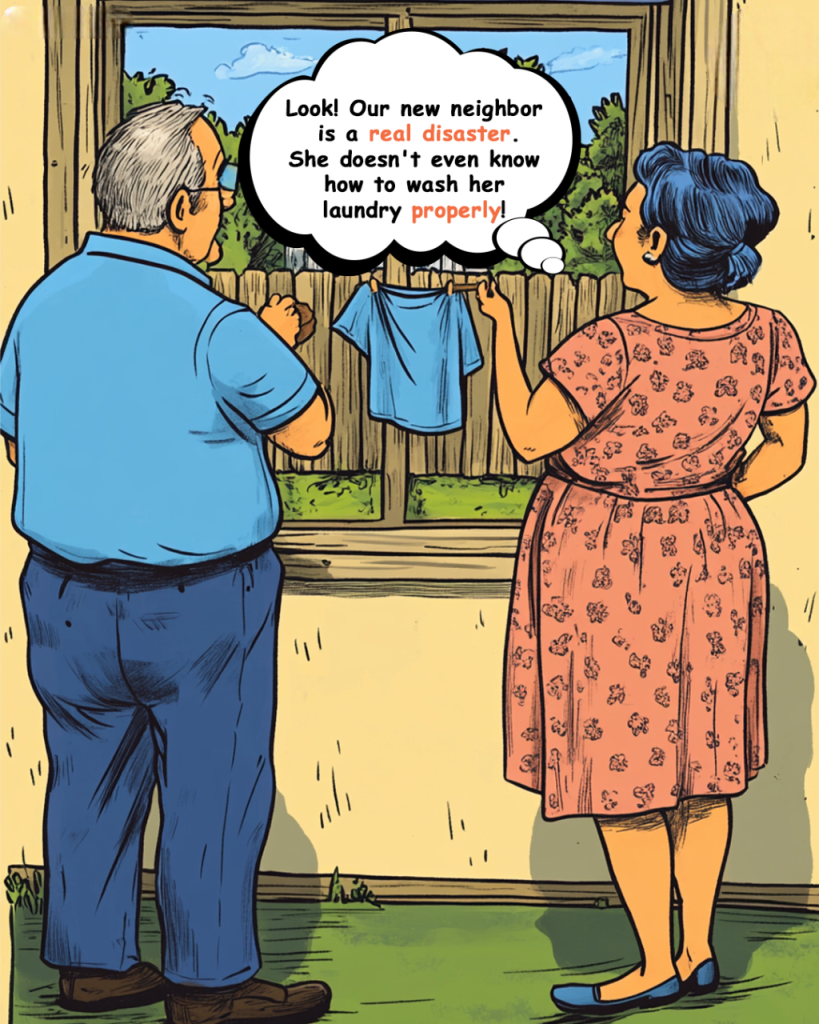
Life’s biggest lessons don’t always come from grand, dramatic events; they can be found in ordinary moments if we’re open to seeing them.
What if the stains you saw weren’t on someone else’s laundry, but on your own window? How does a broken vase reveal the secret to a happy marriage? Can two apples teach us not to judge too quickly? These short yet powerful stories uncover unexpected wisdom in everyday situations, offering lessons about kindness, patience, and the way we see the world.
1. Laundry with Stains
A woman peered out of her window and noticed her new neighbor hanging laundry to dry, but something didn’t seem right—the clothes were covered in stains.
She immediately called her husband over. “Hey, come look! Our new neighbor is a mess! She doesn’t even know how to wash her laundry properly!”
Later, she shared her thoughts with her friends. “Honestly, she couldn’t even wash her laundry correctly!”
As time went on, the woman noticed the same thing—the neighbor’s laundry was still stained.

She rushed to gossip with her friends again, and this time, they decided to see it for themselves. The group gathered outside to check the laundry.
To their surprise, the clothes were now spotless, shining white, with no stains in sight.
One of her friends turned to her and said, “Before you criticize someone else’s laundry, maybe you should clean your windows. They were filthy!”
2. A Happy Family
In a town, there were two neighboring couples. One couple was always arguing, blaming each other for everything, and fighting to prove who was right.
The other couple lived in peaceful harmony, with no arguments or drama.
The more stubborn wife couldn’t understand how her neighbors managed to be so happy. She felt envious.
She turned to her husband and said, “Go see how they do it. Find out how they keep everything so peaceful.”

Her husband went to the neighbor’s house and hid under their window, watching and listening carefully.
He saw the wife tidying up the house and dusting off a delicate vase. Suddenly, the phone rang, distracting her. She placed the vase near the edge of the table, and just then, her husband walked in, bumping the vase, causing it to fall and break.
The neighbor thought, “Oh no, how are they going to handle this?”
But instead of fighting, the wife calmly walked over, sighed, and said, “Sorry, dear. It was my fault. I put the vase too close to the edge.”
Her husband replied, “No, sweetheart. It was my fault. I was rushing and didn’t see the vase.”
She said, “No, it was me. I wasn’t paying attention. But, as they say, it’s for good luck!”
The neighbor felt a pang in his heart and returned home, troubled.
His wife asked, “What’s wrong? Did you figure out how they do it?”
He replied, “Yes, in their house, everyone was willing to take the blame. That’s why they never fought. In our house, though, we’re all too busy trying to be right.”
3. Two Apples: A Lesson in Not Jumping to Conclusions
A little girl came inside holding two apples. Someone had probably given them to her.
“Mom, look at these beautiful apples!” she said excitedly.
“They are indeed lovely! Will you share one with me?” her mom asked.
The girl looked at the apples, then took a bite of one. After a moment of thought, she bit into the other apple as well.
The mother was very surprised and thought to herself, “What a greedy little girl I’m raising! She’s eating both apples and didn’t offer me even one!”
But to her surprise, the little girl handed one of the apples to her mom and said, “Mommy! Take this one. It’s sweeter!”
4. Bad Words
Two friends had a disagreement, and one of them began spreading hurtful things about the other.
But later, he reflected on his actions and realized he was wrong. So, he went to apologize to his friend.
The other friend said, “Okay, I’ll forgive you—but only if you agree to one thing.”
“What’s that?” asked the first friend.
“Take a pillow, tear it open, and let all the feathers blow away in the wind.”

The first friend did as he was asked. He opened the pillow, and feathers scattered all around, carried by the wind.
Once the task was done, the friend returned, saying, “I’ve done what you asked. Am I forgiven now?”
“Yes, but only if you can gather all the feathers and put them back into the pillow.”
But as you can imagine, that was impossible to do.
Just like hurtful words, once they are out in the world and heard by others, you can’t take them back.
5. The Red Rose
A sailor started receiving letters from a woman named Rose, someone he’d never met. Despite that, he responded, and they continued exchanging letters for a long time.
As he read her letters and replied, the sailor began to realize he couldn’t imagine his life without her. When his service came to an end, they made plans to meet at 5 o’clock at a train station.
Rose mentioned she would be wearing a red rose on her lapel.

The sailor hesitated because, although they had been writing for quite some time, he had never seen Rose—not even in a photo. He didn’t know how old she was, if she was beautiful, or whether she was tall or short.
When he arrived at the station exactly at the agreed time, he saw a woman standing under a large clock, wearing a red rose on her lapel. She appeared to be about 50 years old.
For a moment, the sailor was tempted to turn around and leave. But then, he thought it would be unfair. This woman had written to him all that time while he was away at sea, and she deserved to be treated with respect.
So, he approached her, extended his hand, and introduced himself.
But the woman said, “My name isn’t Rose. The young woman named Rose is standing behind me.”
The sailor turned around and saw her. She was young and beautiful.
The older woman explained that Rose had asked her to wear the flower. Had the sailor walked away, their story would have ended right there.
But if he chose to approach the older woman, she would introduce him to the real Rose and share the truth with him, because appearances weren’t everything.
6. Dandelions
There was a man who took immense pride in the perfect, green lawn he had meticulously cared for. One day, he noticed dandelions had begun to bloom among the blades of grass.
He hadn’t planted them, so he considered them to be an unwanted nuisance. Without hesitation, he pulled them out one by one. However, despite his efforts, the dandelions reappeared soon after.
No matter how much he worked to remove them, the dandelions returned, growing stronger each time he tried to get rid of them.
Frustrated, he decided to reach out to a famous agronomist for advice. He detailed every method he had attempted to rid his lawn of the dandelions, concluding with the question:
“I’ve tried everything. Is there any solution you can recommend that I haven’t considered?”
Not long after, he received a response:
“Indeed, there is one approach you haven’t tried: I suggest you learn to love them.”
Moral
Often, the things we resist the most are the ones we must come to terms with. Like the man endlessly fighting dandelions in his yard, we tend to struggle against things we don’t fully understand.
The woman criticizing her neighbor’s laundry failed to notice her own dirty windows, reminding us that our own imperfections often cloud our judgment. The couple at odds discovered that being right mattered less than being kind to one another.
The young girl with two apples taught us not to rush to judgment, as things aren’t always as they first appear. Similar to the sailor and the red rose, genuine connection is born from looking beyond surface-level details and embracing others for who they truly are.
And like words scattered like feathers, once spoken, they cannot be undone. We must face the outcomes of our actions. If we can learn to embrace life’s flaws, both in ourselves and others, we may find a sense of peace that we never imagined.







